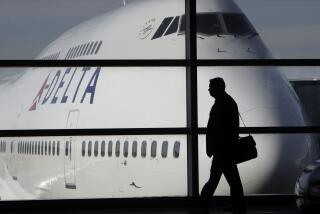Buying a Non-Refundable Ticket?
- Share via
Non-refundable fares are here, and are likely to remain part of the air fare scene. When buying a non-refundable ticket you should be told by the airline or travel agent that it issued on that basis.
There are some reasons, invariably medical, which may get you a refund or a chance to reschedule your flight.
Policies and their implementations can vary from airline to airline. Some carriers have eased their rules in such cases, while others may make it more difficult to get a refund.
Documentation, such as a physician’s note or admission slip to a hospital, is required by airlines that provide the possibility of refunds. Generally, the medical situation has to involve either the passenger or an immediate member of the family.
“While our rules on non-refundable fares are very strict, we have made them more lenient than they were at the outset,” says Vince Durocher, district director of marketing for Delta Airlines. “We recognize that passengers may have valid medical situations, which make it impossible for them to fly.”
Need Documentation
To get a refund on a non-refundable ticket from Delta, you need documentation. “While a death certificate or hospital admission slip are self-explanatory, a doctor’s note has to explain the specific reasons why the passenger was unable to fly, not just state in general that the traveler wasn’t fit,” Durocher says.
An option, Durocher added, is to reschedule the flight. “We’ll change the ticket to another flight within a 30-day period, if passengers show documentation indicating why they couldn’t fly on their original flights.”
The situation at United Airlines is similar, except for the latter option.
“United has general guidelines and our personnel have some discretion based on the individual situation,” a United spokesman says.
“Our policy is to extend refunds if the passenger or an immediate member of the family is sick or there’s a death in the family. The passenger has to provide documentation, such as a doctor’s note.”
Continental and Eastern also permit refunds for death or medical reasons involving the passenger or a member of the immediate family, according to Jeff Morris, manager of administration for both airlines in Los Angeles.
“But a specific reason has to be given in a doctor’s note, stating the illness and the complications that might go with it,” Morris says.
TWA’s policy is to provide a refund if there is a death of the passenger, traveling companion or an immediate member of the family, according to a carrier spokeswoman. But when an illness is involved, travelers get to apply the full value of their ticket for another flight for a year, in lieu of a refund. Pertinent medical documentation is needed in either case.
By contrast, American Airlines provides full refunds upon getting sufficient documentation of either death or illness of passengers or members of their immediate family, according to Steve McGregor, an airline spokesman.
The perspective from travel agents, however, can be somewhat different.
“This is a very gray area with some airlines,” says Martha Scott, manager of Glendale Travel. “When the airlines came out with non-refundable fares there were provisions for refunds for some medical reasons. When these fares were renewed in May, some airlines dropped these provisions.
“Refundability may depend on the individual situation and who is working that day at the airport. In some situations we’ve tried to get a refund for a client and were turned down by the airline. Then the passenger tried on his own and was successful.”
Scott described one such scenario: “We had a man, wife and the husband’s mother-in-law traveling together. The mother-in-law became ill and couldn’t travel. The husband got a doctor’s certificate but we were turned down for a refund. The husband went down to the airport and was issued a refund on the spot.”
In another situation, Scott says, a passenger who was hospitalized with a broken leg had a refund request turned down.
“We always try for a client, because you never know when the airline will bite,” Scott says.
“But we also advise clients that sometimes going to the airport, or city ticket office with the proper documentation, may turn the trick. The airlines can be very public relations conscious, particularly when you tie up a busy line. Don’t leave until the matter is resolved.”
Not everyone, of course, has the disposition or time to try this tactic. To protect themselves, some travelers buy trip cancellation insurance.
Written requests for refunds can be processed after the flight. “We send in the ticket, plus the documentation,” Scott says. “How long it takes to get the refund depends on the method of payment. It could take as much as three or four months.”
The best bet when dealing with Delta, Durocher says, is to call the airline at (800) 221-1212 and advise it of your situation, then ask about the procedure for getting a refund.
Explain Situation
“You may be transferred to a customer service desk, where you can explain your individual situation and get a reading on your chances for a refund,” Durocher says. “This can save you a trip to the airport or a city ticket office.”
Queries about possible refunds on United tickets can be directed to the carrier’s consumer affairs office at (800) 227-4733. Call Continental at (800) 525-0280, Eastern at (800) EASTERN, American at (800) 433-7300 and TWA at (800) 221-2000.
If you apply in person, be ready to provide your ticket and documentation as well as identification that includes a major credit card. You may get an immediate refund but it also may take four to six weeks by mail.
“It might be one or two billing cycles before you see the credit reflected on your credit card statement,” Durocher says.
If you are turned down you can pursue the matter further by sending copies of your particulars to Delta’s office at 3701 Wilshire Blvd., Suite 600, Los Angeles 90010, phone (213) 736-1231, and asking for a review of your refund request. The same steps should be taken with other airlines. If things don’t work out locally, contact the airline’s headquarters.
Suppose you get to the airport too late to catch your flight on a non-refundable ticket. Are you then stuck with your ticket?
Standby Offered
In some cases, you’re simply out of luck. “Some passengers have just had to buy a new ticket,” Scott says. “But in some instances, passengers may be allowed to catch the airline’s next flight on a standby basis. However, you can’t get a refund.”
“Our policy is to permit passengers who check in no later than two hours after their flight to fly standby on the same fare basis on the next available Delta flight,” Durocher says. “You don’t have to explain why you missed the flight, be it a flat tire, traffic gridlock or other circumstances. The fact that you come to the airport, even if late, indicates you tried to make the flight.”
The next available flight could conceivably be the next day. “As long as you are available for the next flight, you can get on if a seat is open,” Durocher says. “But if you decide not to take the next available flight, or aren’t there to board the flight, that ends your flight possibilities on that ticket.”
It’s even possible, Durocher advised, to be told to stand by for a flight that is fully booked, on the possibility of seats opening up by no-shows. “If you weren’t there, and a seat did become available, you would then forfeit any chance of an alternate flight.”
On the other hand, if you don’t get on a flight you’ve been asked to stand by for, you can still try to fly standby on the next available flight, Durocher says.
Many of the other airlines, including United, Continental, American, Eastern and TWA, also use this two-hour cutoff approach that allows you to fly standby on the next available flight.
A variety of other discounts allow partial refunds. The least expensive tickets, however, still assess a 100% penalty. The higher the cost of your ticket, the less the cancellation penalty and the more flexibility you have in making changes in your travel plans.
And while no one presumably buys a non-refundable ticket with the expectation of not making the flight, some airlines are more liberal than others in providing refunds or alternate flights.
One basic test is to ask yourself what the chances are of your plans changing. This is not always easy to do, of course.
One airline spokesman recounted an incident in which a Los Angeles woman had a son scheduled to get married in Florida. Non-refundable tickets for a party of nine were bought two months in advance to guarantee the rate.
Plans went awry, however, when the altar-bound couple broke up two weeks before the flight. Because the reason for not using the tickets wasn’t due to illness or death, the group was out of luck.
More to Read
Sign up for The Wild
We’ll help you find the best places to hike, bike and run, as well as the perfect silent spots for meditation and yoga.
You may occasionally receive promotional content from the Los Angeles Times.






